Français
Finding Our Talk Season Two
- Episode 1: A Brighter Future - Mohawk
- Episode 2: Gentle Words - Maliseet
- Episode 3: The Spirit of Stories - Ojibway
- Episode 4: Language of The North - Naskapi
- Episode 5: Language of The Caribou People - Gwitchin
- Episode 6: Our Past Our Language - Secwepemc (Shushwap)
- Episode 7: Buffalo People - Dakota
- Episode 8 : Healing Power of Words - Dene
- Episode 9: Our Music is Our Language - Oneida
- Episode 10: Words from Our Scholars - Cree
- Episode 11: Words from Our Elders - Blackfoot
- Episode 12: Cultural Centres and Language
- Episode 13: The Dreamers - Dane-Zaa
Finding Our Talk Season One
Finding Our Talk Season Three
Episode 10: Words from Our Scholars - Cree
Indigenous/Native Studies is a rapidly growing field and it is hoped that all communities, native and non-native, could benefit from their contributions and research. In this episode we talk to First Nation scholars about how they apply Aboriginal languages in their fields of study through research and curriculum development. We also closely examine the efforts of two such scholars as they carry on the legacy of their mother, renowned Cree scholar Freda Ahenakew.
Background
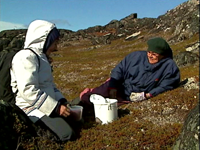 The Canadian Indigenous/Native Studies Association (CINSA) is a community of scholars committed to fostering the development of Aboriginal studies as a discipline uniformed by, and respectful of Aboriginal intellectual traditions and to create a place of respect and dignity for Aboriginal Peoples within Canada and the world. Among its objectives are the dissemination and discussion of research and facilitation of communication among members through such means as conferences.
The Canadian Indigenous/Native Studies Association (CINSA) is a community of scholars committed to fostering the development of Aboriginal studies as a discipline uniformed by, and respectful of Aboriginal intellectual traditions and to create a place of respect and dignity for Aboriginal Peoples within Canada and the world. Among its objectives are the dissemination and discussion of research and facilitation of communication among members through such means as conferences.
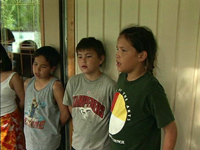 Part 1
Part 1
The first part of the series takes place at the annual CINSA 2001 Honoring Indigenous Knowledge Conference, "In Partnership". Coordinated by Miriam McNab, Department of Indian Studies, University of Saskatchewan, this year's conference pays tribute to Freda Ahenakew and the work she has done in preserving the Cree language and the stories of Cree elders. Miriam explains how more First Nations students are entering the field of Native Studies and how their research can help Aboriginal communities through such means as policy development, lawmaking and court-case decisions.
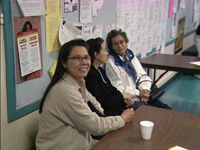 It is here among the conference participants that we meet Dr. Chris Hannibal-Paci, a Curriculum Developer at UBC and Dr. Lenore Stiffarm, Director of Education at the University of Saskatchewan. The two share their personal and academic experiences and talk about the vital importance of language in First Nations studies at the University level.
It is here among the conference participants that we meet Dr. Chris Hannibal-Paci, a Curriculum Developer at UBC and Dr. Lenore Stiffarm, Director of Education at the University of Saskatchewan. The two share their personal and academic experiences and talk about the vital importance of language in First Nations studies at the University level.
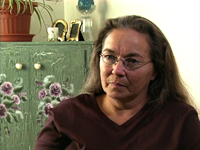 Part 2
Part 2
Two First Nations scholars were honored during the conference, one of them being Freda Ahenakew. Donna Paskemin of the Department of Native Studies at the University of Alberta presented the award to her former teacher, colleague and friend, Freda Ahenakew. We talk to her about the impact Freda and her work has had on her own life.
We also meet two of Freda Ahenakew's daughters, Brenda Ahenakew and Dolores Sand. They speak on the state of the Cree language today, both at the local and administrative levels and the impact of their mother's work. Dolores is currently Education Coordinator for the new school in Muskeg Lake and is the only Cree language teacher in the community. She incorporates a lot of the culture into her lesson plans, prayers, ceremonies, etc. for her students, some who just happen to be her grandchildren. Brenda is the Director of Education for the Saskatoon Tribal Council. She discusses the struggle to her mother has gone through to ensure language remains in the forefront.
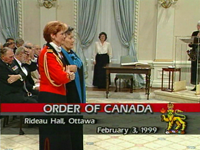 Throughout Saskatchewan Freda Ahenakew's name is synonymous with the retention of Cree language and culture. A teacher of the Cree language at both secondary and post-secondary levels, former director of the Saskatchewan Indian Languages Institute, Freda has recorded the stories of the elders as a way of preserving their traditional knowledge. Cree readers and workbooks used in classrooms across the country today bear her name.
Throughout Saskatchewan Freda Ahenakew's name is synonymous with the retention of Cree language and culture. A teacher of the Cree language at both secondary and post-secondary levels, former director of the Saskatchewan Indian Languages Institute, Freda has recorded the stories of the elders as a way of preserving their traditional knowledge. Cree readers and workbooks used in classrooms across the country today bear her name.
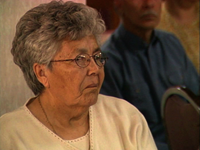 She has also published many journals, articles and manuscripts on and in the Cree language. The mother of 12 has been honored and recognized numerous times for her achievements. In 2001 she was recognized by the National Aboriginal Achievement Foundation. She was awarded the Order of Canada in 1999 and in 2000 the Government of Saskatchewan bestowed upon her the Year of the Older Person Award.
She has also published many journals, articles and manuscripts on and in the Cree language. The mother of 12 has been honored and recognized numerous times for her achievements. In 2001 she was recognized by the National Aboriginal Achievement Foundation. She was awarded the Order of Canada in 1999 and in 2000 the Government of Saskatchewan bestowed upon her the Year of the Older Person Award.

